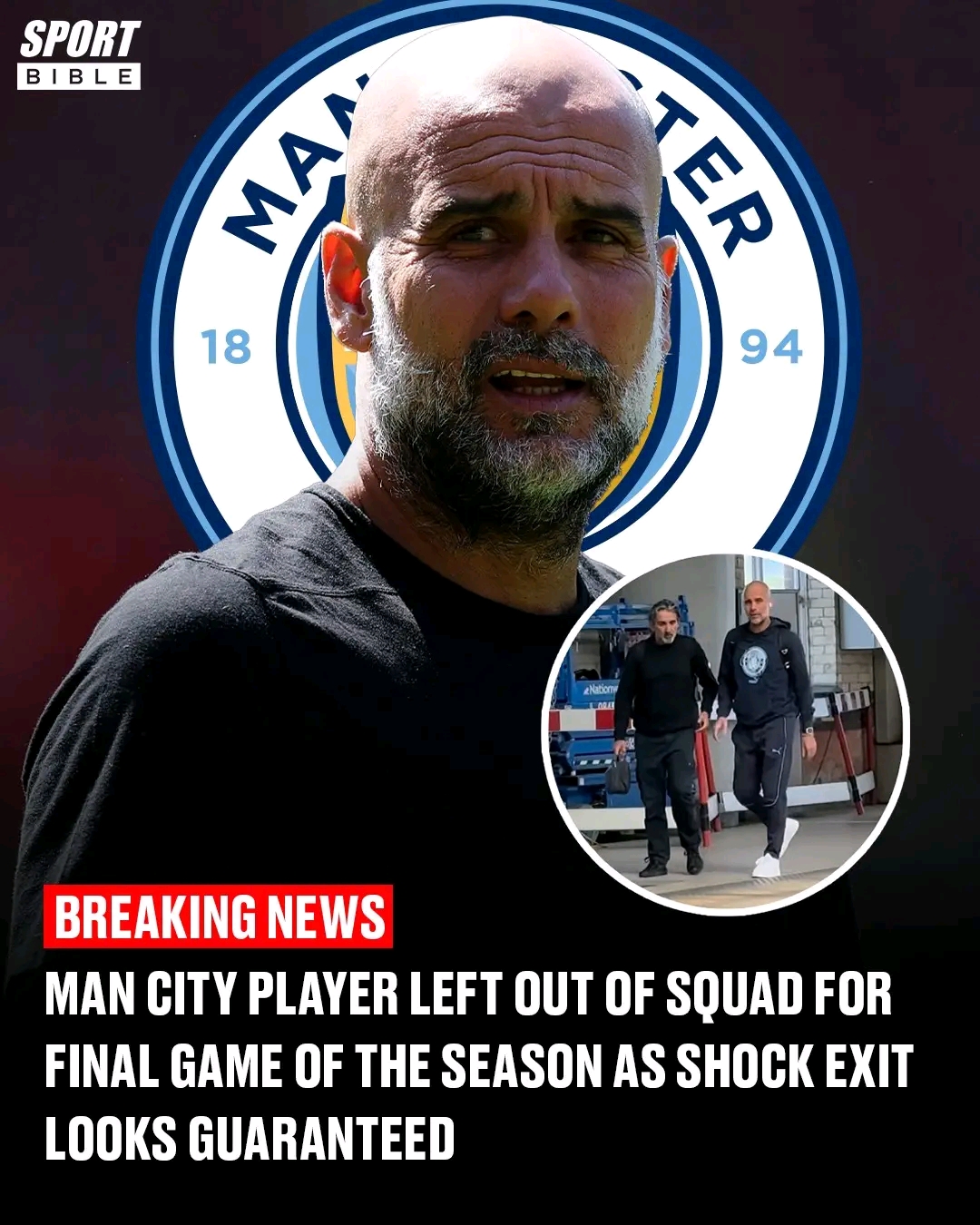Jack Grealish’s Manchester City Future in Doubt as Final Day Omission Signals Potential Exit

Manchester City’s final Premier League fixture of the 2024-25 season against Fulham at Craven Cottage has taken on added significance beyond the team’s quest to secure Champions League qualification. The most telling development isn’t what’s happening on the pitch, but rather who’s missing from Pep Guardiola’s traveling squad entirely. Jack Grealish, the £100 million England international who once represented the pinnacle of City’s ambitious transfer strategy, has been conspicuously omitted from the matchday squad despite being fully fit and available for selection
This exclusion represents far more than a simple tactical decision or squad rotation policy. It signals what appears to be the beginning of the end for Grealish’s tenure at the Etihad Stadium, marking a dramatic fall from grace for a player who was once hailed as the missing piece in City’s championship puzzle. The 29-year-old winger’s absence from such a crucial fixture, where City need just a single point to guarantee their place in next season’s Champions League, speaks volumes about his current standing within Guardiola’s plans.
Manchester City enter their final Premier League encounter of the campaign in third place, mathematically requiring only a draw to secure Champions League qualification for the 2025-26 season. Their superior goal difference over fourth-placed competitors provides them with a comfortable buffer, but the psychological importance of ending what has been a disappointing campaign on a positive note cannot be understated. For a club accustomed to domestic dominance, experiencing their first trophyless season in nine years has been a sobering experience that has prompted serious questions about squad composition and long-term planning.
Fulham, their opponents at Craven Cottage, find themselves in a peculiar position of having nothing tangible to play for in terms of European qualification, yet still harbor ambitions of securing ninth place in the final table. This pursuit of a respectable league finish sees them locked in competition with London rivals Brentford, adding a layer of competitive intensity to what might otherwise be considered a dead rubber fixture.
The timing of Grealish’s omission is particularly striking given City’s relatively healthy squad situation. With only John Stones sidelined through injury and Mateo Kovacic serving a suspension, Guardiola has access to virtually his entire playing roster. In such circumstances, the decision to completely exclude a player of Grealish’s caliber and financial investment suggests this is far from a routine squad management decision.
When Manchester City activated Jack Grealish’s £100 million release clause at Aston Villa in the summer of 2021, the transfer represented more than just a significant financial outlay. It symbolized City’s determination to acquire one of the Premier League’s most creative and unpredictable talents, a player capable of providing the kind of individual brilliance that could unlock the tightest of defensive systems. The fee, which set a new English transfer record at the time, reflected both Grealish’s perceived value and City’s willingness to invest heavily in securing their primary targets
The initial signs were promising. Grealish’s debut season, while not spectacular in terms of individual statistics, demonstrated his ability to adapt to Guardiola’s intricate tactical system. His retention of possession, intelligent movement, and willingness to track back defensively suggested he was beginning to understand the demanding requirements of playing under one of football’s most tactically sophisticated managers.
The 2022-23 campaign marked the peak of Grealish’s City career to date. His contributions to their Premier League triumph were significant, though perhaps not always reflected in traditional metrics like goals and assists. Guardiola’s system often requires players to sacrifice individual glory for collective success, and Grealish appeared to embrace this philosophy wholeheartedly. His ability to stretch defenses, create space for teammates, and maintain possession in tight areas proved invaluable during City’s march to another league title.
However, the subsequent two seasons have told a markedly different story. Grealish’s playing time has diminished significantly, with his appearances becoming increasingly sporadic and his influence on key matches notably reduced. The 2024-25 season has been particularly challenging, with the England international making just seven Premier League appearances throughout the entire calendar year of 2025, and earning only a single start in that perio
Pep Guardiola’s tactical philosophy has always been characterized by constant evolution and adaptation. The Spanish manager’s ability to reinvent his team’s playing style, often multiple times within a single season, has been one of the key factors behind City’s sustained success over the past decade. However, this tactical fluidity has also meant that certain players can quickly find themselves surplus to requirements as the team’s needs change.
Grealish’s predicament appears to stem from this natural evolution of Guardiola’s tactical thinking. The wide forward positions that the Englishman has traditionally occupied have been increasingly filled by players who offer different attributes – perhaps more pace, more defensive solidity, or simply a better understanding of the specific role requirements within Guardiola’s current system.
The emergence of younger players and the successful integration of new signings have further complicated Grealish’s path back into the first team. City’s squad depth, long considered one of their greatest strengths, has become something of a double-edged sword for players like Grealish who have struggled to maintain their place in the starting eleven. When competition for places is so intense, even brief periods of poor form or tactical misfits can result in extended spells on the sidelines.
Guardiola’s recent comments about Grealish’s situation provide insight into the manager’s thinking, though they also reveal the challenging position both player and club find themselves in. The Spanish coach’s acknowledgment that Grealish is “not happy” with his current situation is hardly surprising, but his broader point about player satisfaction speaks to the inherent difficulties of managing a squad full of international-quality players who all expect regular first-team football.
Grealish’s club situation has inevitably impacted his international prospects, with his absence from recent England squads under new manager Thomas Tuchel serving as a stark reminder of how quickly fortunes can change in professional football. The German coach’s decision to overlook Grealish for national team selection reflects the broader consensus that the winger’s current form and playing time don’t justify inclusion at international level.
This international exile adds another layer of urgency to Grealish’s career situation. At 29, he is entering what should be the prime years of his career, yet finds himself in danger of missing out on major tournaments and the opportunity to add to his England cap tally. The prospect of spending another season largely on the bench at City becomes increasingly untenable when viewed through this lens.
The timing is particularly cruel given England’s upcoming fixtures and the potential for major tournaments in the near future. Grealish’s absence from the international setup means he’s missing valuable opportunities to impress the new management team and stake his claim for future selections. Without regular club football, this vicious cycle becomes increasingly difficult to break.
From Manchester City’s perspective, Grealish’s situation presents both challenges and opportunities. The financial reality of modern football means that players commanding significant wages while contributing minimally to first-team success represent poor value for money. City’s reported interest in exploring Grealish’s sale this summer likely reflects both tactical and economic considerations.
The £100 million transfer fee, while significant at the time, has already been largely written off in accounting terms through standard amortization practices. However, Grealish’s wages and the opportunity cost of his squad place remain ongoing considerations. For a club operating under Financial Fair Play regulations, optimizing squad efficiency becomes crucial, and carrying high-earning players who don’t regularly contribute to first-team success is increasingly difficult to justify.
The summer transfer market will likely determine Grealish’s immediate future. Interest from other Premier League clubs or major European teams could provide City with an opportunity to recoup a significant portion of their initial investment while freeing up wages and squad spaces for other targets. The player’s age, proven Premier League experience, and international pedigree should ensure considerable interest, despite his recent struggles at City.
The upcoming FIFA Club World Cup presents an interesting subplot to Grealish’s story. As one of the qualified teams, Manchester City will participate in this expanded tournament, which could theoretically provide Grealish with additional opportunities to prove his worth to Guardiola and potentially revive his City career.
However, reports suggest that City’s hierarchy may not even include Grealish in their Club World Cup squad if they decide to pursue his sale during the summer transfer window. This would effectively end his City career before the tournament even begins, representing a definitive conclusion to what has been a largely disappointing chapter for both player and club.
The Club World Cup’s timing could actually work in City’s favor if they do decide to sell Grealish. The tournament’s proximity to the summer transfer window means that potential buyers will have fresh memories of the player’s capabilities, assuming he does participate. Conversely, if he’s excluded entirely, it would send a clear message to the market about City’s intentions regarding his future
Should Grealish leave Manchester City this summer, several potential destinations could offer him the regular playing time necessary to revive his career. Premier League clubs lacking City’s squad depth might view him as a significant upgrade on their current options, while the player’s proven ability at the highest level makes him an attractive proposition despite his recent struggles.
Aston Villa, his former club, represents an obvious potential destination, though the financial realities of such a move would likely require significant compromise from all parties involved. The emotional appeal of a return to Villa Park, where Grealish established his reputation as one of England’s most promising talents, could prove compelling for both player and club.
Other Premier League clubs with European ambitions but lacking City’s resources might view Grealish as exactly the type of experienced, proven performer needed to take their squads to the next level. The player’s familiarity with English football and his peak years potentially ahead of him make him an attractive proposition for clubs willing to invest in proven quality.
European clubs also represent viable options, particularly those in leagues where Grealish’s style of play might be better suited to the tactical approaches favored by different coaching philosophies. The opportunity to experience a new footballing culture while potentially rediscovering his best form could appeal to a player clearly frustrated with his current situation.
Grealish’s situation at Manchester City serves as a fascinating case study in the complexities of modern football economics and squad management. His transfer represented the type of marquee signing that generates significant excitement and media attention, yet the ultimate measure of success in football remains on-pitch contribution and tactical fit rather than transfer fee or reputation.
The case highlights the inherent risks in big-money transfers, even when acquiring players with proven Premier League credentials. Tactical fit, squad dynamics, and the ability to adapt to new systems and expectations can prove just as important as raw talent and previous achievements. City’s experience with Grealish demonstrates that even the most carefully planned transfers can fail to deliver expected returns.
For other clubs and players, Grealish’s situation provides valuable lessons about the importance of careful consideration when making career moves. The appeal of joining a successful club like Manchester City is obvious, but the reality of limited playing time and tactical requirements that may not suit every player’s strengths must be carefully weighed against the potential benefits of such moves.
Grealish’s apparent departure would represent another significant change in Manchester City’s squad composition as Guardiola continues to shape his team for future challenges. The manager’s willingness to move on from high-profile signings who don’t fit his evolving tactical vision demonstrates the ruthless decision-making that has characterized City’s success under his leadership.
This approach, while occasionally harsh on individual players, has generally served City well in terms of maintaining competitiveness and adapting to changing circumstances. The ability to recognize when a player is no longer contributing optimally and take decisive action has been a hallmark of successful clubs throughout football history.
For City, moving on from Grealish would free up significant resources – both financial and squad-based – that could be redirected toward targets better suited to Guardiola’s current tactical preferences. The club’s recruitment department has generally performed well in identifying players who fit the manager’s requirements, and Grealish’s departure would provide another opportunity to demonstrate this capability.
As Manchester City prepare for their final Premier League fixture of the season without Jack Grealish, the symbolism is hard to ignore. A player who arrived with such fanfare and expectation now finds himself completely excluded from consideration for one of the club’s most important matches of the campaign. This exclusion represents more than just a tactical decision; it signals the likely end of one of the more disappointing big-money transfers in recent Premier League history.
The summer ahead will likely determine whether Grealish can resurrect his career elsewhere or if his time at City will be remembered as a cautionary tale about the complexities of modern football transfers. For Manchester City, moving on from their record signing represents both a financial loss and an opportunity to learn from their mistake while redirecting resources toward players better suited to their tactical requirements.
The football world will watch with interest to see how this situation resolves itself. Grealish’s talent remains evident, and the right club and tactical system could potentially unlock the player who once commanded a £100 million transfer fee. However, his time at Manchester City appears to be drawing to a close, marked not by triumph or controversy, but by the quiet exclusion from a squad list that speaks volumes about his current standing in one of English football’s most successful teams.
The story serves as a reminder that in modern football, no transfer fee is large enough to guarantee success, and no reputation established enough to ensure continued opportunity. As City look ahead to their summer planning and Grealish contemplates his next career move, both parties must confront the reality that sometimes, despite best intentions and significant investment, certain combinations simply don’t work as intended.















